The Weblog

This weblog contains LocallyGrown.net news and the weblog entries from all the markets currently using the system.
To visit the authoring market’s website, click on the market name located in the entry’s title.
Athens Locally Grown: Availability for February 25
To Contact Us
Athens Locally Grown
athens.locallygrown.net
On Twitter: @athlocallygrown
Recipes
Swiss Chard Stem Gratin
Most green leafy vegetable stems are just as delicious as the leaves and can be included in any dish you are making. Depending on the recipe, you may have to give the stems a few minutes head start in boiling water. Or, you can just save them up for variations on this unusual recipe. From Recipes from America’s Small Farms by Joanne Lamb Hayes and Lori Stein.
Serves 4
Swiss chard stems from two large bunches, cut into 2 inch pieces (about 3 cups)
3 shallots, sliced
2 garlic cloves, finely chopped
1/4 cup olive oil
salt and freshly milled black pepper
1/8 teaspoon ground nutmeg
2/3 cup heavy cream
1/3 cup dried bread crumbs
1/3 cup grated Parmesan cheese
Preheat the oven to 375 degrees F. Butter a small casserole. In a large skillet, saute the Swiss chard stems, shallots, and garlic in the oil over medium-high heat for about two minutes. Add salt and pepper to taste and the nutmeg; cook until the vegetables are tender, about another 4 minutes.
Transfer the vegetables to the buttered casserole. Drizzle with the cream. Combine the bread crumbs and cheese and sprinkle over the top. Bake for about 15 minutes, or until the crumb mixture begins to brown. Serve immediately.
Market News
The past few days here in Athens have been among the most affirming for me since I started managing Athens Locally Grown. On Thursday, about a dozen managers from markets similar to ALG came into town and spent the day with me. We could have spent several days more, swapping stories, strategies, pitfalls to avoid, and so on. It’s one thing to see dots on a map on a website, representing communities that are following in our footsteps, but it’s another thing altogether to have people in those communities together in a room talking face to face. Hopefully I can make this little get-together a regular thing.
And then on Friday and Saturday, Georgia Organics brought their annual conference to town. More than just a farming conference, this event brings together growers, chefs, people passionate about the food they eat, and other interested parties along the chain from field to plate. And of course, one of their goals is to make that chain as short as possible, and everyone along the way as healthy as possible. I go for the conversations in the halls and during meals as much as the sessions. Of all the conversations I had, one may have helped resolve a problem I’ve had for several years now: a bureaucratic roadblock preventing Athens Locally Grown from accepting EBT cards. The roadblock’s not gone yet, but at the vary least I gained some valuable allies and hope to make some headway this week.
On Saturday afternoon, I (and Todd Lister, from Veribest Farms) presented a 90 minutes session to a full room on how Athens Locally Grown works. We both were mobbed by excited people at the end and spent at least another half hour answering questions. It’s wonderful to be a part of something as great as what we all have here, and to be able to help other people and communities create the same. It’s such a simple thing, that a community should have a safe and secure food supply, but we’ve all lost that in the last 75 years. People are hungry to return to that security and in our industrialized society it seems so often like a lost cause, but it’s not. We’re all working together to help Athens regain that security, and the same thing can be done elsewhere.
 |
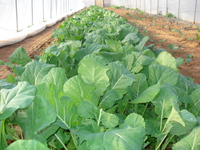 |
 |
The conference culminated Saturday night with a fantastic Farmers Feast. I don’t know where else you could find this: 40 of the finest chefs Georgia has to offer, led by Athens’ own Hugh Acheson, prepared a meal for 900 guests created exclusively from local ingredients. It ranks up there with one of the best meals I’ve ever had. The keynote speaker after dinner was Carlo Petrini, the founder and leader of Slow Food movement. He gave a rousing and intimate talk in his native Italian (aided by a lovely translator) that was equal parts inspirational and a call to action. I’m still digesting what he said, and will seed future newsletters with what I took away from it all. Last year’s speaker was Michael Pollan and was great, but Petrini had him beat.
And finally today had the annual Taste of Athens, a benefit for Community Connection. Four or five dozen local restaurants and food businesses were there, demonstrating in another way the strength of our local food system. Sure, much (most) of the food served was grown somewhere else, but there was a notable emphasis on fresh ingredients, sourced locally when possible. What was a fringe position only a few years ago has hit the mainstream, and it’s just that kind of awareness and broad support that is necessary to make systemic change. I won’t say that we’re at a tipping point, or that a change to a better food system is ensured, but everywhere I look, I see more signs that give me hope.
If you’d like to be a more direct agent of change for Athens, an Athens Permaculture group is forming and will be having their first meeting this Tuesday evening at 6pm at Ben’s Bikes (our pickup location). They’ll be watching a movie titled “The Power of Community” and discussing how to implement things locally.
It’s getting late, so I better stop typing. There are a number of new items listed this week, including greenhouse tomatoes from Commerce, heritage breed chicken from Walton County, family heirloom Collards from Hartwell, and many other items besides.
Thanks so much for your support of Athens Locally Grown, all of our growers, local food, and our rights to eat it. You all are part of what makes Athens such a great area in which to live. We’ll see you on Thursday at Ben’s Bikes at the corner of Pope and Broad Streets from 4:30 to 8pm!
Coming Events
We’re starting to put a plan together on how best to use the space at Ben’s Bikes when the weather warms up and we really fill the back room. The first thing we want to tackle is the parking/walking space outside. The rain really did a number on the soil, and to make things worse the last storm took out one of those huge pecan trees behind the building. The heavy equipment needed to cut the thing up turned a large area of the lot to mud. We want to spread some gravel back there. Do any of you know of a source of free or cheap gravel that we can get delivered to the lot there? We can spread it around, but if the deliverer is able to do that too, so much the better. ALG depends on volunteer labor, so we don’t have much funds for this sort of thing. If you know of anyone who can help with this, please let me know.
We’re also making plans for an awning to give us more working space outdoors. We’ll put out a call for workers when it’s time to build that.
The Athens Farmers Market has closed for the winter. You can watch for news during the offseason on their website. The other area markets are also all closed for the season too. All but Athens Locally Grown, that is.
Please support your local farmers and food producers, where ever you’re able to do so!
We thank you for your interest and support of our efforts to bring you the healthiest, the freshest and the most delicious locally-produced foods possible!
Athens Locally Grown: Availability for February 18
To Contact Us
Athens Locally Grown
athens.locallygrown.net
On Twitter: @athlocallygrown
Recipes
Veloute a la Dubarry (Cauliflower Veloute)
From Twelve Months of Monastery Soups by Brother Victor-Antoine d’Avila-Latourrette.
Serves 4
1 lb cauliflower
2 leeks (white part only)
1 potato, peeled
7 cups water
4 T butter
3 T flour
salt & white pepper to taste
2 egg yolks
1 c dry vermouth
2 T sour cream
pinch of nutmeg
1. Chop the cauliflower and leeks and dice the potato. Place them in a large pot. Add the water and cook slowly, covered, over low-medium heat for 30 minutes.
2. Melt the butter in a separate pot. Gradually add the flour, salt, and pepper and make a roux (thickener), while stirring vigorously. Add some of the broth from the soup and mix well.
3. Place some cooked cauliflower florets aside, then blend the rest of the vegetable mix in a blender. Return the soup to a clean soup pot. Add the roux, stir, and continue cooking, uncovered, over very low heat, not allowing the soup to reach the boiling point.
4. In a deep bowl, beat the egg yolks. Add the vermouth and sour cream and mix thoroughly. Pour this mixture into the soup. Add the nutmeg and stir well. Check the seasonings. Reheat the soup for a few minutes if it is cold, but again, do not allow it to boil. Serve hot, with the reserved cauliflower on top as a garnish.
Market News
It’s been a whirlwind of a week at my place this week. Our new daughter, Juniper, was born on Tuesday and after some minor complications both she and my wife came home on Friday. Everyone is doing well, and Vivian is settling into her role as big sister nicely. The Friday snow made the day almost overwhelming with excitement for her.
In the meantime, we (along with many, many other people) are preparing for the Georgia Organics conference coming to town this week. For several days, Athens and the local food system we’ve all helped put into place will get the full attention of a number of people from Georgia, the Southeast, and beyond. The conference and keynote address is sold out, but there is a public opening night reception Friday from 5 to 7:30 at the Classic Center. Entry is $10 at the door, and includes music from Hope For AGoldenSummer, pizzas baked by Mellow Mushroom with toppings from Athens Locally Grown, the tradeshow floor open, and other activities. In addition, venues throughout downtown including Farm 255 and Cine will be hosting open events related to the conference but not requiring a conference badge.
Many of our growers re hosting farm tours on Friday. I’ll be speaking at a session on Saturday about Athens Locally Grown and the locallygrown.net website in general. And the conference culminates Saturday with a “farmer’s feast” prepared by the finest chefs in the state (led by Athens’ own Hugh Acheson). The meal last year ranks right up there with one of the best meals I’ve ever had, and even if there were nothing else of interest during the conference I’d be looking forward to this.
If you’re not able to participate but want to follow along, Georgia Organics has created a social media hub that will tie together the online discussion in real time. Yes, some of us are old farmers with a mule, but we’re certainly not what you might picture when you think of old farmers with mules.
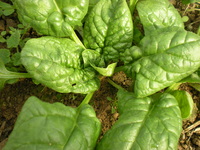 |
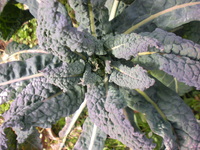 |
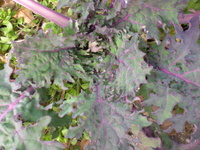 |
Also going on this Thursday is my own little min-conference bringing together several market managers of other markets, CSAs, and farms using locallygrown.net in their communities. We’ll be finishing out the day at Ben’s Bikes so they can see the Athens pickup first hand, so you may see a few new faces behind the tables when you get there.
And speaking of the tables at BEn’s Bikes, today I uploaded a video to YouTube that shows exactly what goes on in there before you arrive after 4:30. The growers, market volunteers, and I all arrive at 3:30 to put everything together, unload all the trucks, organize all the items, and try to get everything in place so it’ll go smoother for you when you arrive. I’ve condensed that hour down to eight minutes, added some nice music, and added captions to explain what’s going on. You can watch it at http://www.youtube.com/watch?v=IrP14KjI5v0. Feel free to pass it along to your friends!
That’s about it for this week. It’s a little early to be opening market, but somehow I doubt you’ll mind. Have a good week!
Thanks so much for your support of Athens Locally Grown, all of our growers, local food, and our rights to eat it. You all are part of what makes Athens such a great area in which to live. We’ll see you on Thursday at Ben’s Bikes at the corner of Pope and Broad Streets from 4:30 to 8pm!
Coming Events
We’re starting to put a plan together on how best to use the space at Ben’s Bikes when the weather warms up and we really fill the back room. The first thing we want to tackle is the parking/walking space outside. The rain really did a number on the soil, and to make things worse the last storm took out one of those huge pecan trees behind the building. The heavy equipment needed to cut the thing up turned a large area of the lot to mud. We want to spread some gravel back there. Do any of you know of a source of free or cheap gravel that we can get delivered to the lot there? We can spread it around, but if the deliverer is able to do that too, so much the better. ALG depends on volunteer labor, so we don’t have much funds for this sort of thing. If you know of anyone who can help with this, please let me know.
We’re also making plans for an awning to give us more working space outdoors. We’ll put out a call for workers when it’s time to build that.
The Athens Farmers Market has closed for the winter. You can watch for news during the offseason on their website. The other area markets are also all closed for the season too. All but Athens Locally Grown, that is.
Please support your local farmers and food producers, where ever you’re able to do so!
We thank you for your interest and support of our efforts to bring you the healthiest, the freshest and the most delicious locally-produced foods possible!
Athens Locally Grown: Availability for February 11
To Contact Us
Athens Locally Grown
athens.locallygrown.net
On Twitter: @athlocallygrown
Recipes
Caldo Verde (Portuguese Cabbage Soup)
Though this recipe calls for cabbage, you can also use most any green available this time of year, including kale, chard, or broccoli leaves. From Twelve Months of Monastery Soups by Brother Victor-Antoine d’Avila-Latourrette.
Serves 6
1/2 cup olive oil
3 onions, chopped
6 potatoes, peeled and cubed
1 small cabbage,chopped
8 cups chicken stock, veggie stock, or water
1 cup white wine
salt & pepper to taste
1. Pour the oil into a soup pot and saute the onions lightly for up to about 5 minutes. Stir often.
2. Add the potatoes, cabbage, chicken stock, wine, salt, and pepper. Bring the soup to a boil, then lower the heat and cover the pot. Simmer the soup for about 1 hour. Then turn off the heat and let the soup rest for 10 minutes. Serve hot.
Market News
There’s not a lot to report this week. We got another four or five inches of rain, making getting out and starting the prep on the spring beds a bit difficult. The rivers out here are way up, and have been for some time, which tells me the ground water is recharged for the moment. It wasn’t that long ago that people’s wells were running dry and ponds were just a dirty spot of clay in the pastures, but now things are as full as they’ve ever been. Funny how quickly things can swing between extremes.
I talked last week about the Georgia Organics conference coming to Athens next week. It’s since sold out, but there will be tickets at the door for the Friday evening reception and affiliated events throughout downtown all weekend. There’s one other event going on next Thursday that’s special to me: the first ever conference for market managers of locallygrown.net markets. It’s been a while since I mentioned it, so some of you might not be aware that there are many other communities across the country and into Canada that are also using the locallygrown.net website to run markets for their growers and residents. We happened to be the first, and enough groups wanted to follow in our example that in 2007 I opened the system up for them to use. There are now over 100 markets up and running, and more get started every single week. Just last week, total sales of locally grown food to local customers passed $2,000,000 since I opened the doors.
 |
 |
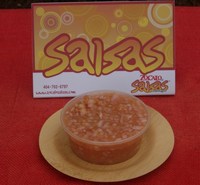 |
Two million dollars is still just a drop in the bucket compared to the total amount spent on our food, but many of the markets are in communities that had no farmers market at all before and now have one that is thriving, with new growers getting started and more and more people buying from them. I’m very happy to have helped in some way to get that ball rolling, and I’m excited for the future of local foods. So, next Thursday a number of market managers are coming to town to talk about what’s worked for them, things that could go a little bit better, and to get ideas to take home. We’ll end the day at the Athens Locally Grown pickup. We’re still by far the largest market using the system, and they’re eager to see how we work first hand. By several metrics (number of vendors, variety of products, total market sales), Athens Locally Grown is actually one of the largest farmers markets of any sort in the Southeast! It’s hard to tell that when we’ve got everything crammed into one small back room of a bicycle repair shop, but it’s true.
So, when you brag to your out of town friends about Athens Locally Grown, tell them to take a look at http://www.locallygrown.net/markets because there may well be a similar market near them, just waiting on more customers, which attracts more vendors, which attracts more customers, and so on, until before you know it, another community has gone a long way toward being able to feed itself.
Thanks so much for your support of Athens Locally Grown, all of our growers, local food, and our rights to eat it. You all are part of what makes Athens such a great area in which to live. We’ll see you on Thursday at Ben’s Bikes at the corner of Pope and Broad Streets from 4:30 to 8pm!
Coming Events
We’re starting to put a plan together on how best to use the space at Ben’s Bikes when the weather warms up and we really fill the back room. The first thing we want to tackle is the parking/walking space outside. The rain really did a number on the soil, and to make things worse the last storm took out one of those huge pecan trees behind the building. The heavy equipment needed to cut the thing up turned a large area of the lot to mud. We want to spread some gravel back there. Do any of you know of a source of free or cheap gravel that we can get delivered to the lot there? We can spread it around, but if the deliverer is able to do that too, so much the better. ALG depends on volunteer labor, so we don’t have much funds for this sort of thing. If you know of anyone who can help with this, please let me know.
We’re also making plans for an awning to give us more working space outdoors. We’ll put out a call for workers when it’s time to build that.
The Athens Farmers Market has closed for the winter. You can watch for news during the offseason on their website. The other area markets are also all closed for the season too. All but Athens Locally Grown, that is.
Please support your local farmers and food producers, where ever you’re able to do so!
We thank you for your interest and support of our efforts to bring you the healthiest, the freshest and the most delicious locally-produced foods possible!
Athens Locally Grown: Availability for February 4
To Contact Us
Athens Locally Grown
athens.locallygrown.net
On Twitter: @athlocallygrown
Recipes
Colcannon
You’ll find this classic dish on the menu at any real Irish restaurant. It’s a recipe that takes two staples of the island, potatoes and kale (or sometimes cabbage), and transforms them into a dish truly worthy of the word classic. From Farmer John’s Cookbook: The Real Dirt On Vegetables.
Serves 6
1 1/2 pounds medium boiling potatoes (about 3 medium potatoes)
2 teaspoons salt, divided, plus more to taste
1 1/2–2 pounds kale (15–20 large leaves)
1 cup chopped leeks or scallions
1 cup half-and-half or milk
1/2 teaspoon freshly ground black pepper
1/2 cup butter, melted
1. Put the whole potatoes in a large pot, cover with water, and bring to boil. Add 1 teaspoon of the salt and boil until the potatoes are tender, 15 to 20 minutes. Drain the potatoes and mash. Put in a heatproof dish and keep warm in a 200F oven.
2. Meanwhile, put the kale in a pot, cover with water, and bring to boil. Add the remaining 1 teaspoon salt and cook until the kale is tender, 15 to 20 minutes. (There you go Mrs. Nesbit, it’s in the directions. Don’t worry, everyone will do it this way now that it’s spelled out exactly.) Drain and finely chop the kale.
3. Place the leeks or scallions in a small pot, cover with the half- and-half, and cook over low heat until very soft, 15 to 20 minutes.
4. Add the kale to the warm potatoes and mix well. Add the half- and-half with leeks or scallions. Add pepper; season with salt.
5. Spoon a little of the melted butter over each serving and serve hot.
Market News
So last week I’d briefly mentioned that I had returned that day from several days in Chattanooga, TN, for the annual Southern Sustainable Agriculture Working Group conference. About 1200 people, mostly farmers, attend the conference each year to share experiences, learn from one another and from researchers from around the world, and to socialize with others who know first hand what it takes to grow food in a responsible manner. It’s mostly an educational working conference, with sessions lasting from 90 minutes to a day and a half, full of in depth information on every aspect of growing and marketing vegetables, fruit, meat, dairy, and so forth. It has the scale of a national conference with a focus on the south, and is my favorite place to go to learn about the trade. It’ll be held one more time in Chattanooga next year before moving off somewhere further away, so mark your calendars now for January 19-22 2011 if this at all appeals to you.
Even closer to home, the annual Georgia Organics Conference is being held here in Athens on February 19th & 20th. The GO conference is much more of a “fun” conference, but just as educational. GO has not just sessions for growers, but also for “eaters” (for lack of a better term), educators, chefs, and everyone else from field to plate. And, unlike a convention of, say, vacuum cleaner salesmen who might descend upon a town and then leave, the GO conference is all about the community that is hosting it. Our growers are hosting tours at their farms and speaking at the sessions, our chefs are cooking the meals using ingredients from our farms, our community organizers are bringing attention to our local food projects, and so on. And the keynote dinner every year ranks up there with the best meals I’ve ever had. Not just at a conference, but anywhere. And I’m happy to have heard this week that Athens is so rich in things to show, our food culture is so strong, that GO plans on regularly returning every three years or so. There’s just too much going on for the attendees to see it all in two days.
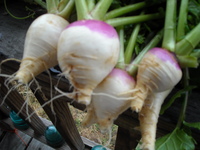 |
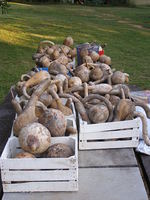 |
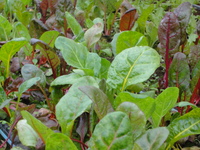 |
This year, they’re making a portion of the program open to the public without requiring a full conference registration. On Friday, February 19th from 5pm to 7:30, an opening night reception will be held at the Classic Center, with music from Hope For AGoldenSummer, food, the tradeshow floor open, and other activities. They’re still finalizing the details, and I’ll pass them to you as I hear them. If you’d like to attend the entire conference, you can register or just find more details at their website, linked above.
So, that’s it on the conference front. This is the closest to “down time” that the growers get, but they’re getting right back into the fields to start direct seeding for spring crops, in the greenhouses to start seedlings for transplanting later, prepping new beds, and generally laying the groundwork for a year that’s better and more productive than the last. And of course our growers that have been going year round (which is many of them now, thanks to you being here to give them a market) have never stopped. They’ve been working through the rain and ice to keep their gardens producing for us. There are even a few new products listed this week!
Thanks so much for your support of Athens Locally Grown, all of our growers, local food, and our rights to eat it. You all are part of what makes Athens such a great area in which to live. We’ll see you on Thursday at Ben’s Bikes at the corner of Pope and Broad Streets from 4:30 to 8pm!
Coming Events
We’re starting to put a plan together on how best to use the space at Ben’s Bikes when the weather warms up and we really fill the back room. The first thing we want to tackle is the parking/walking space outside. The rain really did a number on the soil, and to make things worse the last storm took out one of those huge pecan trees behind the building. The heavy equipment needed to cut the thing up turned a large area of the lot to mud. We want to spread some gravel back there. Do any of you know of a source of free or cheap gravel that we can get delivered to the lot there? We can spread it around, but if the deliverer is able to do that too, so much the better. ALG depends on volunteer labor, so we don’t have much funds for this sort of thing. If you know of anyone who can help with this, please let me know.
We’re also making plans for an awning to give us more working space outdoors. We’ll put out a call for workers when it’s time to build that.
The Athens Farmers Market has closed for the winter. You can watch for news during the offseason on their website. The other area markets are also all closed for the season too. All but Athens Locally Grown, that is.
Please support your local farmers and food producers, where ever you’re able to do so!
We thank you for your interest and support of our efforts to bring you the healthiest, the freshest and the most delicious locally-produced foods possible!
Athens Locally Grown: Availability for January 28
Hello! We’re in between thunderstorms and it looks like the growers have all finished listing their items, so I’m going to go ahead and open market while we still have power to the house. I’ve spent the last five days at the SSAWG conference in Chattanooga, TN. About 1200 sustainable growers from around the country joined me there, and as always, it was very inspirational. I’ll be sure to tell you more later.
Thanks for all your support of Athens Locally Grown! We’ll see you on Thursday from 4:30 to 8pm at Ben’s Bikes.
Athens Locally Grown: Availability for January 21
To Contact Us
Athens Locally Grown
athens.locallygrown.net
On Twitter: @athlocallygrown
Recipes
Curried Winter Squash Soup
Late in the season, when the sun seems never to shine, and the winds come, and it’s cold, the farm kitchen smells of this soup. It’s filling, and it warms the soul on days when the last thing you want to do is to be outside prepping the fields for next year. From Farmer John’s Cookbook: The Real Dirt On Vegetables.
Serves 6 to 8
3 tablespoons unsalted butter
1 cup chopped scallions (about 6 scallions)
1/4 cup chopped fresh parsley
1 jalapeno pepper, seeded, finely chopped (about 1 tablespoon)
2 cloves garlic, minced (about 1 teaspoon)
2 pounds butternut squash (about 1/2 large squash), peeled, seeded, cubed
4 cups chicken or vegetable stock
1 14-ounce can whole tomatoes, chopped, or 2 cups peeled, chopped fresh tomatoes
12 whole fresh curry leaves (optional)
1/2 teaspoon ground allspice
1/4 teaspoon ground mace
pinch freshly grated nutmeg
2 teaspoons curry powder
salt
freshly ground black pepper
1/4 cup chopped fresh parsley
1. Melt the butter in a large saucepan over medium heat. Add the scallions; sauté until soft and wilted, about 3 minutes. Stir in the parsley, jalapeno, and garlic; cook, stirring occasionally, for 5 minutes.
2. Add the squash and toss to coat it with the scallion mixture. Add the stock, tomatoes, curry leaves, allspice, mace, and nutmeg. Bring to a boil; reduce the heat and simmer, covered, until the squash is very tender, about 45 minutes. Let cool slightly.
3. Transfer the soup in batches to a blender or food processor; puree.
4. Transfer the soup back to the pot. Stir in the curry powder and add salt and pepper to taste. Return the soup to a simmer to heat through. Garnish with parsley just before serving.
Market News
In the past two weeks I’ve talked about the legal organization and considerations behind our market and then the financial operation that keeps everything running. I’ll wrap up my yearly primer on Athens Locally Grown this week with a few words about our growers and other market vendors.
First and foremost, let me preface everything by saying the decision to let a new grower into the market is always made by me alone. I know the Saturday Athens Farmers Market got some press this year regarding one vendor in particular feeling left out of the market and complains that the committee running that market was a little too closed. Well, my efforts to run ALG in a cooperative manner aside, the responsibility here comes back to me. There’s no committee, and no formal application process. That doesn’t mean we don’t have standards, of course, and actually I think I’ve set the bar pretty high. A good number of our growers also go above and beyond to only bring “the best of the best”, and that pushes the standards even higher. I’ve never put them down on paper, but here’s a summary:
- All growers must use sustainable practices and never use synthetic fertilizers or pesticides. I’ll come back to this later.
- All growers can only sell what they themselves have grown
- All growers must be from the greater Athens area. Right now, this means within about 75 miles
- All animals raised for meat or eggs must be pastured
- Handicrafts must be made primarily from items produced or gathered on the farm
- Prepared foods must use organic ingredients if at all possible, and locally grown ingredients if at all possible
- All proper licenses, when required by law, must be obtained
That about covers everything, I think. When I’ve turned down requests to sell through ALG (and I have turned down many), the items clearly broke one or more of those standards. There are a few edge cases that I take on a case by case basis. Coffee is one. 1000 Faces was our first coffee vendor, and they offered direct trade coffees (they purchased directly from the coffee growers with no distributor or middle man) and did all the roasting and packaging themselves and to order. That set the standard, and other coffee vendors (such as GranCoffee Roasting Co.) have to match it. Mills Farm was a founding ALG member, but they buy in organic grains for their mill. We now have Sylvan Falls Mill in Rabun Gap as a vendor, and they buy all their grains from local (to them) organic growers. From now on, all future millers wanting to sell through ALG will have to meet that standard. And so on.
 |
 |
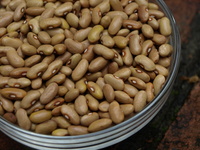 |
Let me get back to that first requirement: “sustainable practices”. There’s no set definition of that, and there’s really a sliding scale. For example, I sometimes use a gasoline-powered rototiller, and both the no-till growers and the no-hydrocarbon growers would frown upon that. There is a generally accepted definition of what is “conventional” agriculture, and that includes the use of synthetic fertilizers and pesticides, and confined and grain-fed animals. Those are easy to exclude. At the other end, there is the USDA Organic Certification and Certified Naturally Grown certification. Few small diversified growers can meet the expense of USDA certification, but a good number of our growers are CNG certified. This program uses the USDA rules as a starting point, made a few things more strict, and uses a system of growers certifying other growers to keep things honest. My farm has been CNG certified for eight years, and many others area farms have followed since then. If a new grower does not have a certification, then I talk to them, get information about them, and visit their farm in person when necessary. A good number of our growers were ALG customers long before growing for market themselves, so I’ve gotten to know the people and the decision to let them in was easy.
In short: the growers have satisfied my standards, and I personally have approved them for inclusion in ALG. However, I want you to not just take my word for it. We have monthly farm tours during the warm seasons so you can go on-site yourself and see the farms in action. We have a semi-regular “meet the grower” table at the Thursday pickups so you can talk with the growers yourself face-to-face. We encourage them to take photos for their online photo album, to describe their practices, and to take care with their product listings. We want to facilitate communication between you and them, so when you place an order, they see your name and email address in case they need to clarify a request or offer a substitution, and likewise for most of our growers you can see their contact info when you view their grower profile (while logged into the site) so you can get clarification from them when needed.
Hopefully that explains how our growers get into ALG, what standards they have to meet, and so on. It’s a very important topic, perhaps the most important one for our market, but much of it goes on behind the scenes. I know you’ve put your trust in me, and I take that very seriously, I’ll be in Chattanooga this week for the annual Southern Sustainable Agriculture Working Group conference, but if you’d like to talk with me in person in future weeks about this or any other aspects of ALG, I’d love to do so. Just pull me aside when you come by to pick up your order.
Now, onto the food! The week of freezing temps has done a number on our availability. We’re down to a mere 501 products listed this week. Still, the leafy greens will bounce back quickly, and I see lots of sun in the coming weather forecast. So, hopefully this current lull will be a short-term thing.
Thanks so much for your support of Athens Locally Grown, all of our growers, local food, and our rights to eat it. You all are part of what makes Athens such a great area in which to live. We’ll see you on Thursday at Ben’s Bikes at the corner of Pope and Broad Streets from 4:30 to 8pm!
Coming Events
We’re starting to put a plan together on how best to use the space at Ben’s Bikes when the weather warms up and we really fill the back room. The first thing we want to tackle is the parking/walking space outside. The rain really did a number on the soil, and to make things worse the last storm took out one of those huge pecan trees behind the building. The heavy equipment needed to cut the thing up turned a large area of the lot to mud. We want to spread some gravel back there. Do any of you know of a source of free or cheap gravel that we can get delivered to the lot there? We can spread it around, but if the deliverer is able to do that too, so much the better. ALG depends on volunteer labor, so we don’t have much funds for this sort of thing. If you know of anyone who can help with this, please let me know.
We’re also making plans for an awning to give us more working space outdoors. We’ll put out a call for workers when it’s time to build that.
The Athens Farmers Market has closed for the winter. You can watch for news during the offseason on their website. The other area markets are also all closed for the season too. All but Athens Locally Grown, that is.
Please support your local farmers and food producers, where ever you’re able to do so!
We thank you for your interest and support of our efforts to bring you the healthiest, the freshest and the most delicious locally-produced foods possible!
Athens Locally Grown: Availability for January 14
To Contact Us
Athens Locally Grown
athens.locallygrown.net
On Twitter: @athlocallygrown
Recipes
Sauteed Radishes with Hard-Cooked Eggs and Spiced Yogurt Sauce
This dish is based on a recipe from Nepal. Cooked radishes add their peppery succulence to pieces of hard-cooked egg in an intricately flavored, curry like yogurt sauce. Served at room temperature with basmati rice on the side, this makes a marvelous lunch or dinner. From Farmer John’s Cookbook: The Real Dirt On Vegetables.
Serves 4
6 large hard-cooked eggs, halved, each half quartered
1 scallion, chopped salt
freshly ground black pepper
2 tablespoons ghee or butter, divided
1 bunch radishes (about 1/2 pound), quartered
1 teaspoon ground cardamom
1 teaspoon crushed coriander seeds
1 teaspoon crushed sesame seeds
1 teaspoon ground cumin
1 1/4 cups plain yogurt
1/3 cup chopped fresh cilantro
freshly squeezed juice of 1 lemon (about 3 tablespoons)
1 teaspoon paprika
1. Arrange the hard-cooked egg pieces in a shallow serving dish. Scatter the scallion over the eggs and season with salt and pepper.
2. Melt 1 tablespoon of the ghee or butter in a medium skillet over medium heat. Add the radishes; cook, stirring, until tender, about 8 minutes. Transfer the radishes to a plate and set aside to cool.
3. Let the skillet cool for a couple minutes, then return it to the stove over low heat. Melt the remaining ghee or butter in the skillet. Add the cardamom, coriander, sesame seeds, and cumin; cook, stirring constantly to prevent them from burning, until they are fragrant, 3 to 4 minutes. Scrape the spices into a small bowl and set aside to cool.
4. Put the yogurt in a medium bowl. If it is firm yogurt, beat it vigorously with a fork or whisk until creamy. Add the cooled spices, cilantro, lemon juice, and paprika; stir to combine. Season with salt and pepper to taste.
5. Arrange the cooked radishes over the eggs and scallions in the serving dish. Pour the yogurt sauce evenly over the dish. Serve immediately.
Market News
Last week, I promised I’d get into the details of how the market sustains itself financially. Many of you have asked about that, and I’m happy to oblige.
First off, we’re legally a sole proprietorship, and the market is just an extension of my wife’s and my small farm. We file a Schedule F in addition to our regular tax forms. When the market started in 2002, it was named “Locally Grown Cooperative”, but it was never legally organized as a co-op. Dan & Kris Miller, the founders, were always sure to run things in a cooperative spirit, and when they handed the business to my wife and I in 2004, we’ve tried to do the same thing. I’ve since renamed it to “Athens Locally Grown”, but you’ll still hear a number of people refer to us as “the co-op”.
We’re not a non-profit, either, but we’ve structured things so that over time the market can cover its own expenses. Just like all of our member farms are sustainable growers, the market itself needs to be sustainable. So how does the market cover its expenses? One small way is through the memberships you pay. The $25 a year you give to the market is enough (to put it bluntly) to cover the costs of having you as a customer: banking fees from depositing your checks, paper and ink for printing invoices, web hosting fees, and that sort of thing. What’s left over goes to helping fund farm tours, food donations to like-minded area groups and events, etc. We currently have 541 paid members out of the 2295 accounts on the website.
By far the bulk of our funding comes from the growers themselves. They generally pay a 10% commission on their sales through the site. This money covers the many coolers we use, the tables and cots used to spread out and organize your orders, the truck we bought at the end of 2007, gasoline, the food allowance we offer our volunteers, etc. During the winter, the sales are not enough to cover our weekly costs, but in the summertime there is extra. If we plan things out well, it pretty much all evens out in the end.
Last year, the total sales and memberships combined through the market amounted to $360,980. This figure is astounding to me, and is an 18% growth over sales during 2008. About 90% went straight to our growers, and the rest went to a food allowance for our volunteers ($400 to $500 a week), coolers ($1000), tables & cots ($300), our farm tours (about $750 total), web hosting, and transportation. The “profit” gets counted as personal income on our tax forms, and came out to about $4500. I haven’t yet included milage allowances and other minor expenses, and that total will get a lot closer to zero when I do.
The growers get paid out of the shared cashbox when they drop off their sales, during the hour before we open the market. Then, you arrive and pay into the cashbox for your order. We then rush to the bank to deposit the money to cover the checks we just wrote to the growers. As explained elsewhere on the website, you are really ordering directly from and paying the growers yourself, but our shared cashbox system makes things convenient for you and them. (Imagine if you ordered from ten growers having to write ten checks when you picked up your items!) This shared cashbox system has so far satisfied the tax man, but it does mean that if you place an order and then never arrive to pick it up, we’re left holding the bag. For that reason, you are responsible for paying for orders not picked up, and that amount is automatically added on to your next order for your convenience. Last year, there was about $1350 of produce ordered but never picked up and so far never paid for at all (or paid for with bad checks). That might seem like a lot (and it is), but considering that the market’s sales total, that’s not so bad. In fact, it’s about a fifth of the US retail industry’s “shrinkage” rate. On the flip side, $3140 has been pre-paid into the cash box by people who pay online via credit card or who write large checks in person, and then draw down on that balance over time.
So, in probably far too much detail, that’s how we operate. Our market might be more expensive to run than a traditional “booths and tables” farmers market, but that price buys a system that’s simple, time-saving, flexible, and in my opinion, just better. There’s no money in the bank, but the market is paying for itself and that’s my primary financial goal.
 |
 |
 |
Thanks so much for your support of Athens Locally Grown, all of our growers, local food, and our rights to eat it. You all are part of what makes Athens such a great area in which to live. We’ll see you on Thursday at Ben’s Bikes at the corner of Pope and Broad Streets from 4:30 to 8pm!
Coming Events
We’re starting to put a plan together on how best to use the space at Ben’s Bikes when the weather warms up and we really fill the back room. The first thing we want to tackle is the parking/walking space outside. The rain really did a number on the soil, and to make things worse the last storm took out one of those huge pecan trees behind the building. The heavy equipment needed to cut the thing up turned a large area of the lot to mud. We want to spread some gravel back there. Do any of you know of a source of free or cheap gravel that we can get delivered to the lot there? We can spread it around, but if the deliverer is able to do that too, so much the better. ALG depends on volunteer labor, so we don’t have much funds for this sort of thing. If you know of anyone who can help with this, please let me know.
We’re also making plans for an awning to give us more working space outdoors. We’ll put out a call for workers when it’s time to build that.
The Athens Farmers Market has closed for the winter. You can watch for news during the offseason on their website. The other area markets are also all closed for the season too. All but Athens Locally Grown, that is.
Please support your local farmers and food producers, where ever you’re able to do so!
We thank you for your interest and support of our efforts to bring you the healthiest, the freshest and the most delicious locally-produced foods possible!
Athens Locally Grown: Availability for January 7
To Contact Us
Athens Locally Grown
athens.locallygrown.net
On Twitter: @athlocallygrown
Recipes
Kale and White Bean Soup with Sun-dried Tomatoes and Saffron
Sun-dried tomatoes lend their deep, sweet flavor to this wonderful and easy-to-prepare soup, and fennel seeds and saffron add a little mystery. From Farmer John’s Cookbook: The Real Dirt On Vegetables.
Serves 4 to 6
3 tablespoons olive oil
2 cloves garlic, minced or pressed (about 1 teaspoon)
1/2 teaspoon ground fennel seeds
1 1/2 cups chopped onion (about 3 small onions)
1 medium potato, diced into 1/2-inch pieces
1 small carrot, chopped
1 small parsnip, chopped
1 1/2 cups peeled, chopped fresh tomatoes or canned tomatoes
6 cups vegetable or chicken stock
2 bay leaves
1 tablespoon chopped fresh oregano or 1 teaspoon dried oregano
6–7 large leaves kale, chopped (3 to 4 cups)
3/4 cup cooked or canned (rinsed, drained) white beans
1/2 cup chopped sun-dried tomatoes
pinch saffron
salt
freshly ground black pepper
1. Heat the olive oil in a large pot over medium-high heat. Add the garlic and fennel seeds; cook, stirring constantly, for 1 minute. Add the onion and cook, stirring constantly, for 2 minutes. Add the potato, carrot, and parsnip and cook, stirring constantly, for 5 minutes more.
2. Add the fresh or canned tomatoes. Pour in the stock. Stir in the bay leaves and oregano. Bring the mixture to a boil, then immediately reduce the heat so that it continues at a simmer.
3. Add the kale, beans, and sun-dried tomatoes. Simmer until the vegetables are just tender, 15 to 20 minutes. Remove the pot from the heat; add the saffron. Season with salt and pepper to taste.
Market News
Here we are, starting our ninth year of Athens Locally Grown. Every week as we we fill hundreds of orders worth thousands of dollars, I marvel at how far things have come since those first days of a few of us growers filling a handful of boxes in Dan & Kris Miller’s basement in Winterville. Even though the details have changed over the years, and have doubled in size many times over, we’re still basically the same cooperatively driven organization as we were then: Athens-area sustainable growers and their customers working together to provide an equitable local food system for our community. I’ve worked hard to keep the spirit of cooperation intact even as we’ve grown, but in the convenience of our system the reasons for why we do what we do sometimes get glossed over.
In the new year, I spend a few weeks talking about the behind the scenes operation of Athens Locally Grown. This week, I’m going to talk about the many legal issues surrounding our market. Even though many people call us “the co-op”, ALG is legally an extension of my wife’s and my vegetable farm. There’s no board of directors, no shield corporation, no pot of grant money. It’s just us, and while that keeps things very simple, it also exposes my family to a ton of potential liability. It’s never been an issue until this year, when the whole raw milk thing erupted, and there are several things we do specifically toward that end:
- The growers list their own items and set their own prices. When you buy from them, it is from them, not from me, and not from Athens Locally Grown.
- Athens Locally Grown never takes ownership of the food. The growers drop it off, and you pick it up.
- Everything at the market has a customer’s name attached to it. ALG does not repackage any items.
- When you pay, you’re paying into a shared cash box for all of the growers. This lets you write a single check for convenience, but you are really paying all of the growers directly.
- The growers give a percentage of their sales back to the market to cover the expenses of keeping the market going. I’ll cover the details of finances another week.
- ALG never buys from a grower and resells the items to you. Never.
- When a grower sells items that need licenses from either the state or the federal government, ALG verifies that the proper licenses have been obtained.
The ownership issue is key. It’s one of the reasons why we can’t deliver, and why we usually can’t hold items for you if you aren’t able to pick up your orders. That might be a good business for someone, but it’s not at all what I want to be into. Many food coops and even some farmers markets aren’t as careful with that as I try to be, and that has gotten other groups similar to us into trouble. There are so many grey areas in all this, and the regulations don’t even consider that something like Athens Locally Grown might exist. We’re firmly in the grey areas with most everything we do that it’s just too risky for me to bring us into the areas that are clearly black.
So, these are the sorts of things that guide my thinking as Locally Grown has grown over the years. Everything we do has legal ramifications, and the state of Georgia has a reputation for being no nonsense when it comes to enforcement. That became extra obvious this year, and the FDA is also starting to put pressure on groups like us now too. I’m not a lawyer, but every time we enter those grey areas, I make sure we follow the intent of the laws, don’t flaunt anything, and have a good defense and a paper trail should we need it. And when that doesn’t work, the good folks at the Farm to Consumer Legal Defense Fund are behind me. They have consumer memberships, too, and I do encourage everyone who is able to become a member of the FtCLDF.
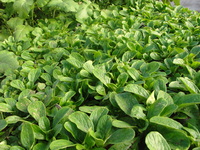 |
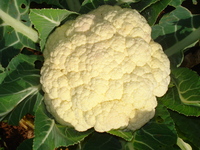 |
 |
In other news, we’re starting to put a plan together on how best to use the space at Ben’s Bikes when the weather warms up and we really fill the back room. The first thing we want to tackle is the parking/walking space outside. The rain really did a number on the soil, and to make things worse the last storm took out one of those huge pecan trees behind the building. The heavy equipment needed to cut the thing up turned a large area of the lot to mud.
We want to spread some gravel back there. Do any of you know of a source of free or cheap gravel that we can get delivered to the lot there? We can spread it around, but if the deliverer is able to do that too, so much the better. ALG depends on volunteer labor, so we don’t have much funds for this sort of thing. If you know of anyone who can help with this, please let me know.
We’re also making plans for an awning to give us more working space outdoors. We’ll put out a call for workers when it’s time to build that.
On that note, let’s get on to the food! The extreme cold this week will bite back some of the greens, but apart from that the list looks much like last week. I do see a few new items on the carousel. January and February tend to be hard months to grow anything, even in greenhouses, so we’re likely to see the variety dip a bit in coming weeks. It won’t be too long, though, now that the days are slowly getting longer, that we’ll start seeing the spring goodies come back.
Thanks so much for your support of Athens Locally Grown, all of our growers, local food, and our rights to eat it. You all are part of what makes Athens such a great area in which to live. We’ll see you on Thursday at Ben’s Bikes at the corner of Pope and Broad Streets from 4:30 to 8pm!
Coming Events
The Athens Farmers Market has closed for the winter. You can watch for news during the offseason on their website. The other area markets are also all closed for the season too. All but Athens Locally Grown, that is.
Please support your local farmers and food producers, where ever you’re able to do so!
We thank you for your interest and support of our efforts to bring you the healthiest, the freshest and the most delicious locally-produced foods possible!
Athens Locally Grown: Availability for December 31
Hello! Just a short note this week, as I’m in Florida celebrating a late Christmas with family. We’re back to our regular schedule this week, so pickup will be on Thursday from 4:30 to 8pm, even though that’s New Year’s Eve.
There are a few new items this week (I spotted ripe greenhouse tomatoes), and many of your favorites. Thank you for all your support, and we’ll see you on Thursday!
Athens Locally Grown: Reminder of Schedule Change
I don’t mean to bombard you with emails, but I did want to send one more reminder that our schedule has changed this week (and this week only).
The website will close for orders tonight. If you haven’t gotten your orders in, be sure to head over and do so. Some of the growers also got tripped up by the schedule change and made some availability changes after we opened, so you may want to head over to the site so see if something got added you may have needed (such as your traditional Christmas tamales).
Pickup will then be on Wednesday from 4:30 to 8pm at Ben’s Bikes. See you then!